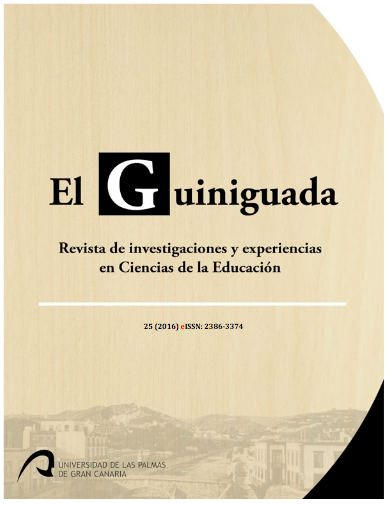Pedagogía del Quijote (y 2): aprendizaje y didáctica, cuatrocientos años después. doi 10.20420/ElGuiniguada.2016.0080
Keywords:
reflexión, Quijote, pedagogía, monográfico, didáctica, IV CentenarioAbstract
Contiene una presentación general de la sección monográfica que El Guiniguada. Revista de investigaciones y experiencias en Ciencias de la Educación dedica nuevamente al Quijote. Bajo la denominación genérica de Pedagogía del Quijote los volúmenes 24 y 25 ofrecen respectivamente, en su sección 1, tres y dos reflexiones en torno al magistral relato cervantino.
Específicamente en esta introducción se presentan las dos reflexiones del volumen 25.
DOI 10.20420/ElGuiniguada.2016.0080
Downloads
References
Calvino, Í. (1992). Por qué leer los clásicos. Barcelona: Tusquets.
Dijk, T.A. (1980). Texto y contexto. Semántica y pragmática del discurso. Madrid: Cátedra.
Freire, P. (1972). Pedagogía del oprimido. Buenos Aires: Siglo XXI Editores Argentina.
Jauss, H.R. (1992). Experiencia estética y hermenéutica literaria. Madrid: Taurus.
Monterroso, A. (2003). Literatura y vida. Madrid: Alfaguara.
Parrilla, C. (2005). Libros de caballerías en el Quijote. Lectura y lectores: ¿el texto espejo? Boletín de la Biblioteca de Menéndez Pelayo. Cervantes y El Quijote, 329-362.
Pérez, F. (2005). Menéndez Pelayo y la cultura literaria de Cervantes. Boletín de la Biblioteca de Menéndez Pelayo. Cervantes y El Quijote (BBMP LXXXI)427-474.
Rodríguez, J.C. (2003). El escritor que compró su propio libro. Para leer el Quijote. Barcelona: Debate.
Todorov, T. (2009). La literatura en peligro. Barcelona: Círculo de Lectores, SA.
Published
How to Cite
Issue
Section
License
Authors who publish with this journal agree to the following terms:
- Authors retain copyright and grant the journal right of first publication with the work simultaneously licensed under a Creative Commons Attribution License that allows others to share the work with an acknowledgement of the work's authorship and initial publication in this journal. You can not make a commercial use of the work. The use derived from the work is also not allowed.
- Authors are able to enter into separate, additional contractual arrangements for the non-exclusive distribution of the journal's published version of the work (e.g., post it to an institutional repository or publish it in a book), with an acknowledgement of its initial publication in this journal.
- Authors are permitted and encouraged to post their work online (e.g., in institutional repositories or on their website) prior to and during the submission process, as it can lead to productive exchanges, as well as earlier and greater citation of published work (See The Effect of Open Access).

















